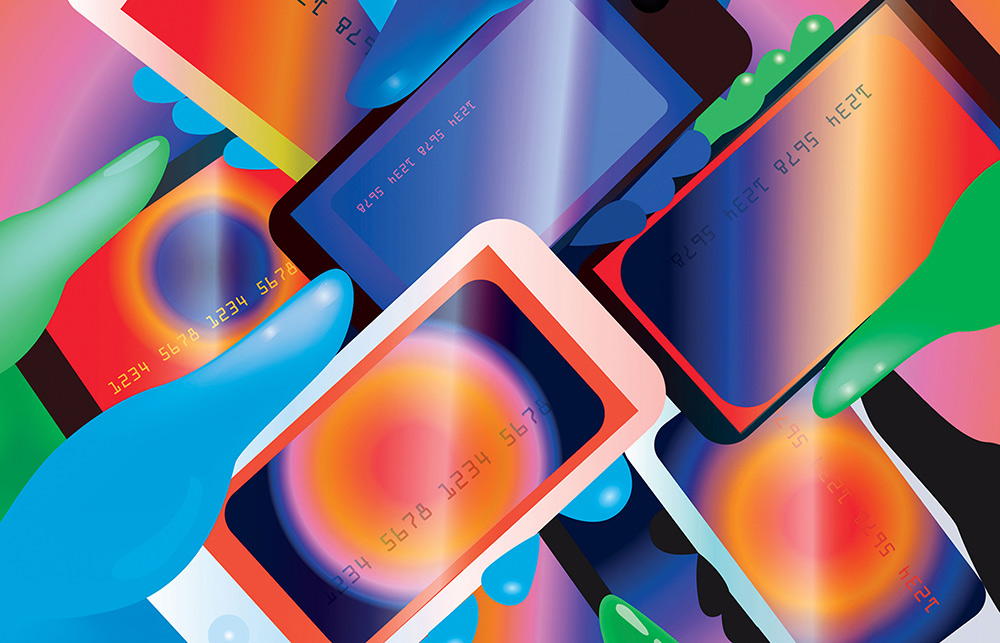在“大衰退”(2008年金融危机引起的经济衰退)之后,美国国会通过了《多德-弗兰克法案》,旨在约束金融行业的欺诈行为。该法案除了承认富有创新精神的企业家采用非传统金融方式的合法性,还要求银行向消费者提供电子数据。由此,金融科技产业应运而生。
如今新冠疫情蔓延,世界经济正面临金融危机以来最严峻的挑战,金融科技企业也迎来大考。SoFi、Robinhood、Chime这类金融科技公司建立和发展的基础,都是承诺借助互联网帮助消费者和企业更好地获得各种资金,包括投资、信贷、点对点借款等,通常无需和实体银行打交道。目前全球经济大部分处于停滞状态,数百万人骤然失业,数千家银行分行纷纷关闭,该是金融科技公司兑现“承诺”的时候了。今年3月,美国政府通过了一项2万亿美元的经济刺激法案,其中包括免除小企业贷款和向美国人发放1200美元现金支票。美国财政部部长史蒂文·姆努钦宣布:“所有金融科技贷款机构都可获授权提供贷款”,这在历史上还是第一次。4月,美国国税局宣布符合条件的受益人可选择使用Square’s Cash或 Venmo等支付应用接收救济资金,不用再靠实体支票,使支付平台进一步得到肯定。

在线支付服务商PayPal、 Square 以及业内其他公司也纷纷响应号召前来助阵。PayPal的首席执行官丹·舒尔曼在加州居家办公期间,与财政部保持着密切联系,每天只能抽空跟员工开个视频会议。通过网络电话Skype接受《财富》杂志采访时,他说:“我经常告诉员工:现在是我们的时代。”在美国国税局发放救助资金之前,被视为银行最大“挑战者”的美国金融科技公司Chime就已经投入2000万美金提供无息预支薪水,向超过10万名客户每人借出最多1200美元。Chime的首席执行官克里斯·布里特说:“感觉我们有可能引领行业风潮。”
事实上,隔离在家的消费者对金融应用的依赖程度确实创下历史新高。最近几天,PayPal及其点对点支付应用 Venmo的新注册用户已经达到疫情大流行前正常值的两倍。用户使用这些应用的目的也出乎意料,比如向身处困境的个人捐助善款,或者捐助医务人员需要的设备等,总金额达数千万美元。最近,流行歌星泰勒·斯威夫特通过PayPal给数十位因为新冠疫情而失去工作或无收入的歌迷赠送了3000美元的惊喜“礼物”。根据Venmo公司数据显示,3月带有口罩表情符号的交易飙升了375% ,这并非偶然现象。
眼下的危机已经成为金融科技公司验证理念的机会,即使疫情过后人们可以重新去银行柜台办理业务,存款和转移资金的方式也可能会有所改变。扎克·佩雷特在初创公司Plaid担任首席执行官,其软件支持美国几乎各大金融科技应用(Visa最近同意收购该公司),他说:“当以后我们回顾这段封城隔离时期时,可能会说这是数字化飞速发展的黄金时期。”(财富中文网)
译者:Feb
在“大衰退”(2008年金融危机引起的经济衰退)之后,美国国会通过了《多德-弗兰克法案》,旨在约束金融行业的欺诈行为。该法案除了承认富有创新精神的企业家采用非传统金融方式的合法性,还要求银行向消费者提供电子数据。由此,金融科技产业应运而生。
如今新冠疫情蔓延,世界经济正面临金融危机以来最严峻的挑战,金融科技企业也迎来大考。SoFi、Robinhood、Chime这类金融科技公司建立和发展的基础,都是承诺借助互联网帮助消费者和企业更好地获得各种资金,包括投资、信贷、点对点借款等,通常无需和实体银行打交道。目前全球经济大部分处于停滞状态,数百万人骤然失业,数千家银行分行纷纷关闭,该是金融科技公司兑现“承诺”的时候了。今年3月,美国政府通过了一项2万亿美元的经济刺激法案,其中包括免除小企业贷款和向美国人发放1200美元现金支票。美国财政部部长史蒂文·姆努钦宣布:“所有金融科技贷款机构都可获授权提供贷款”,这在历史上还是第一次。4月,美国国税局宣布符合条件的受益人可选择使用Square’s Cash或 Venmo等支付应用接收救济资金,不用再靠实体支票,使支付平台进一步得到肯定。
在线支付服务商PayPal、 Square 以及业内其他公司也纷纷响应号召前来助阵。PayPal的首席执行官丹·舒尔曼在加州居家办公期间,与财政部保持着密切联系,每天只能抽空跟员工开个视频会议。通过网络电话Skype接受《财富》杂志采访时,他说:“我经常告诉员工:现在是我们的时代。”在美国国税局发放救助资金之前,被视为银行最大“挑战者”的美国金融科技公司Chime就已经投入2000万美金提供无息预支薪水,向超过10万名客户每人借出最多1200美元。Chime的首席执行官克里斯·布里特说:“感觉我们有可能引领行业风潮。”
事实上,隔离在家的消费者对金融应用的依赖程度确实创下历史新高。最近几天,PayPal及其点对点支付应用 Venmo的新注册用户已经达到疫情大流行前正常值的两倍。用户使用这些应用的目的也出乎意料,比如向身处困境的个人捐助善款,或者捐助医务人员需要的设备等,总金额达数千万美元。最近,流行歌星泰勒·斯威夫特通过PayPal给数十位因为新冠疫情而失去工作或无收入的歌迷赠送了3000美元的惊喜“礼物”。根据Venmo公司数据显示,3月带有口罩表情符号的交易飙升了375% ,这并非偶然现象。
眼下的危机已经成为金融科技公司验证理念的机会,即使疫情过后人们可以重新去银行柜台办理业务,存款和转移资金的方式也可能会有所改变。扎克·佩雷特在初创公司Plaid担任首席执行官,其软件支持美国几乎各大金融科技应用(Visa最近同意收购该公司),他说:“当以后我们回顾这段封城隔离时期时,可能会说这是数字化飞速发展的黄金时期。”(财富中文网)
译者:Feb
In the wake of the Great Recession, as lawmakers passed the Dodd-Frank legislation to rein in an ignominious financial industry, one paragraph of the law also validated a rebel contingent of reform-minded entrepreneurs. The passage mandated that banks must make consumers’ data available to them “in an electronic form.” And so was born the fintech industry.
Now, as the novel coronavirus presents the world with its biggest economic challenge in more than a decade, fintech is having a moment of truth. Companies like SoFi, Robinhood, Chime, and others were built on promises of providing consumers and businesses with easier access to money in all its forms—investments, credit, person-to-person payments—via the Internet, and often without dealing with a brick-and-mortar bank. With the global economy largely on pause, millions of people abruptly out of work, and thousands of bank branches shuttered, the time for fintech to deliver on those promises has arrived. As the U.S. government passed a $2 trillion stimulus package in March, including forgivable small-business loans and $1,200 checks for Americans, Treasury Secretary Steven Mnuchin stipulated that “any fintech lender will be authorized to make these loans”—a historic first. In April, these platforms earned further validation when the Internal Revenue Service allowed eligible recipients to elect to receive stimulus payments electronically—through Square’s Cash App, for instance, or Venmo—rather than by paper check.
PayPal, Square, and other fintech players are heeding the call to help. In between calls with the Treasury Department, Dan Schulman, PayPal’s CEO, has been holding daily videoconferences with employees from his home office in California. “One of the things I’m telling them is, this is our time,” he tells Fortune via Skype. Even before the IRS began disbursing stimulus money, Chime, the largest so-called challenger bank in the U.S., went out on a $20 million limb—giving more than 100,000 customers immediate access to as much as $1,200 through an interest-free payday advance. “We felt that this could create some sort of industry movement,” says Chris Britt, Chime’s CEO.
Indeed, consumers holed up at home are relying on financial apps in record numbers. New sign-ups at PayPal, along with its peer-to-peer payment app Venmo, have been double the pre-pandemic norm on recent days. They’re also using the apps in ways they weren’t designed for, such as to donate money to struggling individuals or to fund needed equipment for health care workers—totaling tens of millions of dollars. When Taylor Swift, the pop star, recently sent a surprise $3,000 “gift” to dozens of her fans who’d lost jobs or income as a result of the coronavirus, she did it via PayPal. It’s no coincidence that Venmo payments using the medical-mask emoji surged 375% in March, according to the company.
The crisis has become a proof-of-concept for fintech, one likely to change the way people bank and move their money even after they can visit a teller in person again. Says Zach Perret, CEO of Plaid, a startup whose software powers virtually all the major U.S. fintech apps (and which Visa recently agreed to acquire): “This shutdown time, I’ll suspect we’ll look back and say this was one in which digitalization really accelerated.”






